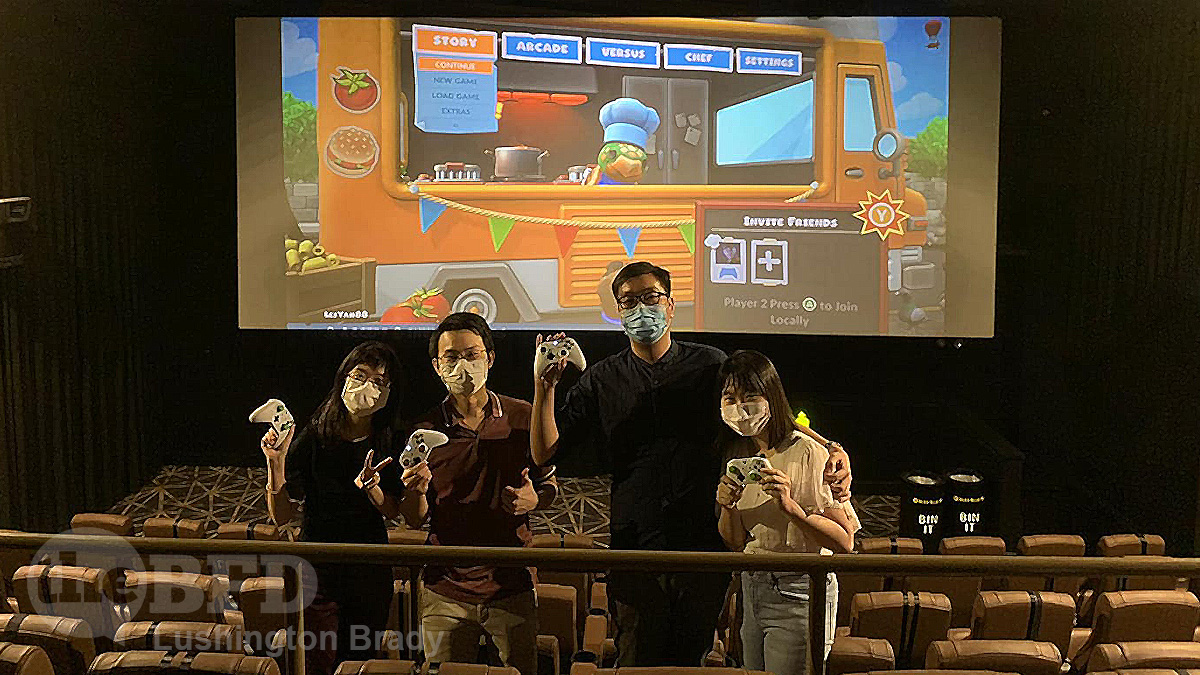The great genius of capitalism is its ability to harness human ingenuity. Socialism, as Frank Zappa wisely said, “produced bad music, bad art, social stagnation, and really unhappy people”.
Even when pandemic-licensed governments do their damnedest to get their socialism on, and completely control the means of production by arbitrarily deciding which businesses are “essential” enough to be allowed to stay open, capitalist innovation finds a way. Whether it’s a strip club reinventing itself as a food delivery service, or cinemas hiring themselves out to gamers.
Eui Jeong Lee and three of her friends sit in an otherwise empty 200-seat cinema auditorium and play a video game on the giant screen.
As Ms Lee blasts her gaming opponents with her wireless controller, the sound whips loudly around the dark room from the numerous cinema speakers.
“The sound quality is particularly amazing,” says the 25-year-old student. “The sound of the gunshots is just so vivid, and when something flew directly at me from the screen I even screamed.”
Ms Lee and her mates had hired the screen for two hours at a branch of South Korea’s largest cinema chain, CGV.
To be certain, this is not the ideal business model for cinemas. But, within the vagaries of bureaucratic diktats, it can make the difference between surviving and going completely under.
The auditoriums being hired out have between 100 and 200 seats, and by comparison CGV movie tickets cost around $12 each. So a 100-seat screen half filled for a film would bring in revenues of $600, rising to $1,200 for a 200-seat one at 50% capacity. And that is before the filmgoers buy their drinks and popcorn.
Yet while CGV isn’t making anywhere as much money from the gamers, it is bringing in some additional income.
Thanks to the genius of entrepreneurship.
CGV employee Seung Woo Han came up with the idea after he realised that films and video games share many similarities.
“When thinking about how to make use of empty cinema spaces, I noticed that games nowadays boast excellent graphics and well structured stories just like movies,” he says. “Both have a storytelling aspect to them, so if someone can enjoy watching a film in the cinema, I thought they would also enjoy playing computer games in one.”
Since the new service launched at the start of this year, auditoriums have been booked more than 130 times so far. While the majority of customers are said to be men in their 30s or 40s, couples and families have also taken part.
Without such innovation, the cinema industry will almost certainly vanish, if governments and bureaucrats persist with their insane authoritarianism.
The extent to which the global cinema industry has been devastated by the Covid-19 pandemic makes grim reading. Global ticket sales in 2020 plunged 71% to $12.4bn (£8.9bn) down from $42.5bn in 2019, according to movie industry trade magazine Variety.
In the US, the country’s largest cinema chain, AMC Theatres, needed a $917m cash injection in December to see off reports that it risked having to seek bankruptcy protection. Meanwhile, in the UK last month, leading British film-makers called on the government to offer financial support to the country’s big cinema chains.
Korea’s CGV is not the only cinema chain now letting gamers book cinema screens, as US group Malco Theatres has been doing the same since November[…]Other US chains, such as AMC and Cinemark, have been allowing customers in small groups to book auditoriums for private screenings.
Other innovations cinemas are trying are such things as delivering cinema food to people’s homes, or even setting up as COVID vaccination centres.
Tyrone Walker-Hebborn, the cinema’s owner, says the pandemic has been disastrous for both cinemas and the wider film industry.
“It’s been the most difficult period I’ve ever known in my 21 years in the industry,” he says. “And it has potentially damaged the film industry forever.
“We basically have not traded for a year now, and I think there are few businesses who can survive that.”
Yet Mr Walker-Hebborn remains confident for the longer term: “I’m extremely optimistic about the future of cinema, and not only do I think cinemas will survive the pandemic, I believe they are a necessary community cornerstone for people to heal from the pandemic.
BBC
Cinemas have survived television, VCRs, DVDs and streaming services. Whether they will survive power-mad governments remains to be seen.
Please share this article so that others can discover The BFD

